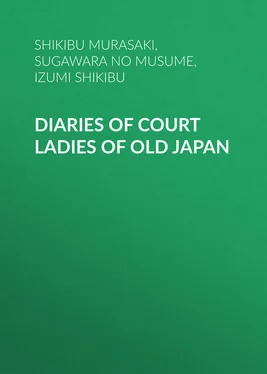Shikibu Murasaki - Diaries of Court Ladies of Old Japan
Здесь есть возможность читать онлайн «Shikibu Murasaki - Diaries of Court Ladies of Old Japan» — ознакомительный отрывок электронной книги совершенно бесплатно, а после прочтения отрывка купить полную версию. В некоторых случаях можно слушать аудио, скачать через торрент в формате fb2 и присутствует краткое содержание. Жанр: История, foreign_edu, на английском языке. Описание произведения, (предисловие) а так же отзывы посетителей доступны на портале библиотеки ЛибКат.
- Название:Diaries of Court Ladies of Old Japan
- Автор:
- Жанр:
- Год:неизвестен
- ISBN:нет данных
- Рейтинг книги:4 / 5. Голосов: 1
-
Избранное:Добавить в избранное
- Отзывы:
-
Ваша оценка:
- 80
- 1
- 2
- 3
- 4
- 5
Diaries of Court Ladies of Old Japan: краткое содержание, описание и аннотация
Предлагаем к чтению аннотацию, описание, краткое содержание или предисловие (зависит от того, что написал сам автор книги «Diaries of Court Ladies of Old Japan»). Если вы не нашли необходимую информацию о книге — напишите в комментариях, мы постараемся отыскать её.
Diaries of Court Ladies of Old Japan — читать онлайн ознакомительный отрывок
Ниже представлен текст книги, разбитый по страницам. Система сохранения места последней прочитанной страницы, позволяет с удобством читать онлайн бесплатно книгу «Diaries of Court Ladies of Old Japan», без необходимости каждый раз заново искать на чём Вы остановились. Поставьте закладку, и сможете в любой момент перейти на страницу, на которой закончили чтение.
Интервал:
Закладка:
No one with such a gift can fail to be lonely, and Murasaki Shikibu seems very lonely, but it is not the passionate rebellion of Izumi Shikibu, nor the abiding melancholy of the author of the "Sarashina Diary"; rather is it the disillusion of one who has seen much of the world, and knows how little companionship she may expect ever to find: "It is useless to talk with those who do not understand one and troublesome to talk with those who criticize from a feeling of superiority. Especially one-sided persons are troublesome. Few are accomplished in many arts and most cling narrowly to their own opinion."
I have already shown Murasaki Shikibu's beautiful taste in dress, but indeed it is in everything. When she says "The garden [on a moonlight night] was admirable," we know that it must have been of an extraordinary perfection.
The Diary proves her dramatic sense, as the "Genji" would also do could it find so sympathetic a translator. No wonder, then, that it leapt into instant fame. There is a pretty legend of her writing the book at the Temple of Ishiyama at the southern end of Lake Biwa. The tale gains verisimilitude in the eyes of visitors by the fact that they are shown the chamber in the temple in which she wrote and the ink-slab she used, but, alas! it is not true. We do not know where she wrote, nor even exactly when. The "Genji" is supposed to have been begun in 1002, and most commentators believe it to have been finished in 1004. That she should have been called to Court in the following year, seems extremely natural. Queen Akiko must have counted herself most fortunate in having among her ladies so famous a person.
The Diary tells the rest, the Diary which was begun in 1007. We know no more of Murasaki Shikibu except that no shade of scandal ever tinged her name.
One of the strangest and most interesting things about the Diaries is that their authors were such very different kinds of people. Izumi Shikibu is as unlike Murasaki Shikibu as could well happen. As different as the most celebrated poet of her time is likely to be from the most celebrated novelist, for Izumi Shikibu is the greatest woman poet which Japan has had. The author of seven volumes of poems, this Diary is the only prose writing of hers which is known. It is an intimate account of a love affair which seems to have been more than usually passionate and pathetic. Passionate, provocative, enchanting, it is evident that Izumi Shikibu could never have been the discriminating observer, the critic of manners, which Murasaki Shikibu became. Life was powerless to mellow so vivid a personality; but neither could it subdue it. She gives us no suggestion of resignation. She lived intensely, as her Diary shows; she always had done so, and doubtless she always did. We see her as untamable, a genius compelled to follow her inclinations. Difficult to deal with, maybe, like strong wine, but wonderfully stimulating.
Izumi Shikibu was born in 974. She was the eldest daughter of Ōe Masamune, another Governor of Echizen. In 995, she married Tachibana Michisada, Governor of Izumi, hence her name. From this gentleman she was divorced, but just when we do not know, and he died shortly after, probably during the great pestilence which played such havoc throughout Japan and in which Murasaki Shikibu's husband had also died. Her daughter, who followed in her mother's footsteps as a poet, had been born in 997. But Izumi Shikibu was too fascinating and too petulant to nurse her disappointment in a chaste seclusion. She became the mistress of Prince Tametaka, who also died in 1002. It is very soon after this event that the Diary begins. Her new lover was Prince Atsumichi, and the Diary seems to have been written solely to appease her mind, and to record the poems which passed between them and which Izumi Shikibu evidently regarded as the very essence of their souls.
In the beginning, the affair was carried on with the utmost secrecy, but clandestine meetings could not satisfy the lovers, and at last the Prince persuaded her to take up her residence in the South Palace as one of his ladies. Considering the manners of the time, it is a little puzzling to see why there should have been such an outcry at this, but outcry there certainly was. The Princess took violent umbrage at the Prince's proceeding and left the Palace on a long visit to her relations. So violent grew the protestations in the little world of the Court that, in 1004, Izumi Shikibu left the Palace and separated herself entirely from the Prince. It was probably to emphasize the definiteness of the separation that, immediately after her departure, she married Fujiwara Yasumasa, Governor of Tango, and left with him for that Province in 1005. The facts bear out this supposition, but we do not know it from her own lips, as the Diary breaks off soon after she reaches the South Palace.
In 1008, she was summoned back to Kiōto to serve the Queen in the same Court where Murasaki Shikibu had been since 1005. Whatever effect the scandal may have had four years earlier, her receiving the post of lady-in-waiting proves it to have been worth forgetting in view of her fame, and Queen Akiko must have rejoiced to add this celebrated poet to her already remarkable bevy of ladies. Of course there was jealousy – who can doubt it? No reader of the Diaries can imagine that Izumi Shikibu and Murasaki Shikibu can have been sympathetic, and we must take with a grain of salt the latter's caustic comment: "Lady Izumi Shikibu corresponds charmingly, but her behavior is improper indeed. She writes with grace and ease and a flashing wit. There is a fragrance even in her smallest words. Her poems are attractive, but they are only improvisations which drop from her mouth spontaneously. Every one of them has some interesting point, and she is acquainted with ancient literature also, but she is not like a true artist who is filled with the genuine spirit of poetry. Yet I think even she cannot presume to pass judgment on the poems of others." Is it possible that Izumi Shikibu had been so rash as to pass judgment on some of Murasaki Shikibu's efforts?
Of course it is beyond the power of any translation to preserve the full effect of the original, but even in translation, Izumi Shikibu's poems are singularly beautiful and appealing. In her own country, they are considered never to have been excelled in freshness and freedom of expression. There is something infinitely sad in this, which she is said to have written on her death-bed, as the end of a passionate life:
"Out of the dark,
Into a dark path
I now must enter:
Shine [on me] from afar
Moon of the mountain fringe." 1 1 Translation by Arthur Waley in Japanese Poetry.
In Japanese poetry, Amita-Buddha is often compared to the moon which rises over the mountains and lights the traveller's path.
Very different again is the lady who wrote the "Sarashina Diary," and it is a very different kind of record. Murasaki Shikibu's Diary is concerned with a few years of her life, Izumi Shikibu's with one episode only of hers, but the "Sarashina Diary" covers a long period in the life of its author. The first part was written when she was twelve years old, the last entry was made when she was past fifty. It begins with a journey from Shimōsa to Kiōto by the Tōkaidō in 1021, which is followed by a second journey some years later from Kiōto to Sarashina, a place which has never been satisfactorily identified, although some critics have supposed it to have been in the Province of Shinano. The rest of the Diary consists of jottings at various times, accounts of books read, of places seen, of pilgrimages to temples, of records of dreams and portents, of communings with herself on life and death, of expressions of resignation and sorrow.
The book takes its name from the second of the journeys, "Sarashina Nikki," meaning simply "Sarashina Diary," for, strangely enough, we do not know the author's name. We do know, however, that she was the daughter of Fujiwara Takasué, and that she was born in 1009. In 1017, Takasué was appointed governor of a province, and went with his daughter to his new post. It is the return journey, made in 1021, with which the Diary opens.
Читать дальшеИнтервал:
Закладка:
Похожие книги на «Diaries of Court Ladies of Old Japan»
Представляем Вашему вниманию похожие книги на «Diaries of Court Ladies of Old Japan» списком для выбора. Мы отобрали схожую по названию и смыслу литературу в надежде предоставить читателям больше вариантов отыскать новые, интересные, ещё непрочитанные произведения.
Обсуждение, отзывы о книге «Diaries of Court Ladies of Old Japan» и просто собственные мнения читателей. Оставьте ваши комментарии, напишите, что Вы думаете о произведении, его смысле или главных героях. Укажите что конкретно понравилось, а что нет, и почему Вы так считаете.












